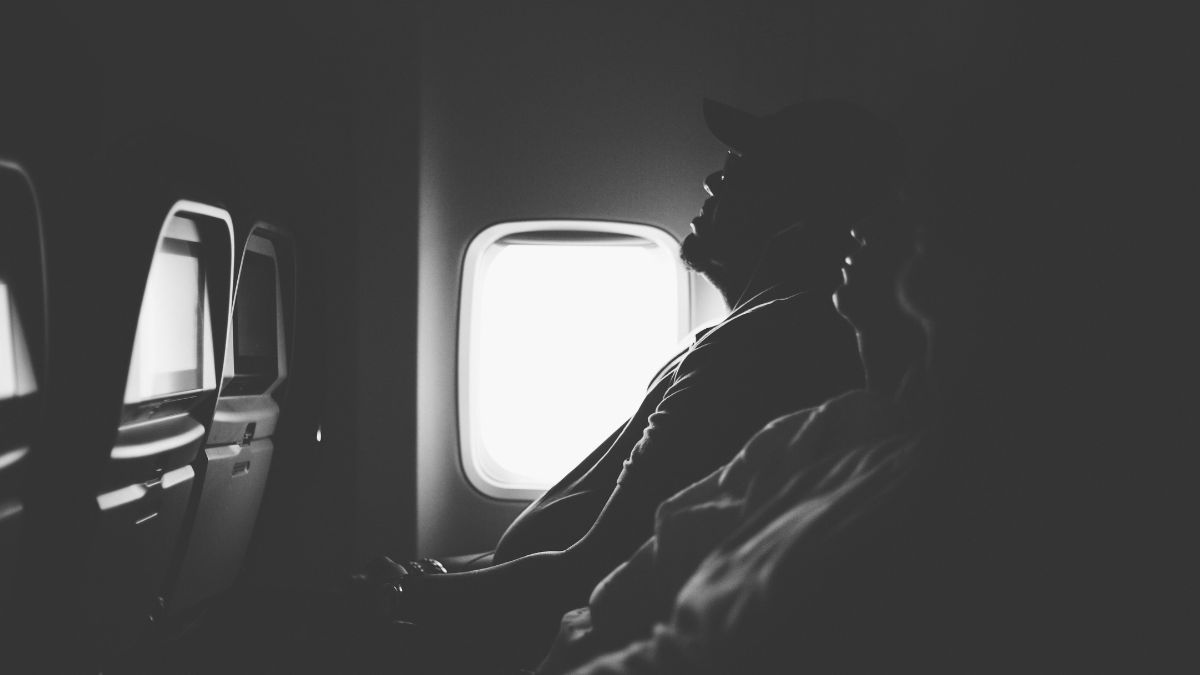Can You Bring Melatonin on a Plane? Guidelines and Benefits Explained

As participants in Amazon Associates and other programs, we earn from qualifying purchases. This comes at no additional cost to you. For more details, see our Affiliate Disclosure.
As our world becomes increasingly global, the necessity of air travel continues to grow, and so too does the necessity of understanding the rules and regulations around what can and cannot be taken on a plane. One of the items that frequent flyers often ask about is melatonin—a popular supplement known for its role in regulating sleep cycles.
This non-prescription sleep aid can be a boon for those navigating through time zones and combating the dreaded jet lag. However, understanding the legalities and guidelines around carrying melatonin on a flight can be quite perplexing. This article aims to dispel any confusion regarding traveling with melatonin, while exploring its benefits and practical uses during air travel.
What is Melatonin and Why Would You Need it on a Plane?
Melatonin is a hormone naturally produced by the body in the pineal gland, located in the brain. It plays a crucial role in regulating the body’s circadian rhythm—our internal 24-hour clock that governs sleep and wakefulness. When it’s dark, your body produces more melatonin to signal that it’s time to go to sleep. Conversely, melatonin production drops when it’s light, signalling that it’s time to wake up.
Aside from the natural production of melatonin, it can also be made synthetically and is available as an over-the-counter supplement in many countries. People often use it to help manage insomnia, shift work sleep disorder, and other sleep-related issues. Synthetic melatonin comes in various forms including pills, liquids, and chewable tablets, with a range of dosages.
When it comes to air travel, melatonin can be particularly beneficial. Travelers crossing multiple time zones may experience jet lag, characterized by symptoms such as fatigue, insomnia, and general discomfort, all resulting from the body’s circadian rhythm being out of sync with the local time. Taking melatonin can help “reset” your body’s internal clock to better align with the new time zone.
Moreover, air travel can often be stressful and uncomfortable, leading to difficulty in falling asleep during the flight. Since melatonin aids in sleep, having it on a plane can help passengers get some much-needed rest, making their journey more comfortable and helping them arrive at their destination refreshed.
Understanding Airport Security: Can You Bring Melatonin on a Plane?
Airport security procedures are stringent worldwide, with specific regulations around what can and can’t be brought onto a plane, particularly concerning liquids and gels. However, when it comes to over-the-counter medications and dietary supplements like melatonin, the guidelines are generally more lenient.
In most cases, you can bring melatonin on a plane without any issue. The Transportation Security Administration (TSA) in the United States allows passengers to bring unlimited amounts of over-the-counter medications and supplements in pill or solid form in both checked luggage and carry-on bags. This includes melatonin tablets. If the melatonin is in a liquid, gel, or aerosol form, it must adhere to the standard 3-1-1 liquid rules for carry-on bags. This means it must be in a container of 3.4 ounces (100 milliliters) or less, and all such containers must fit into a single, one-quart clear zip-top bag.
However, it’s essential to note that while TSA doesn’t have a problem with melatonin, customs regulations in your destination country might. Some countries have strict rules about bringing in medications and supplements, and you may need to declare them at customs. Always research the specific regulations of your destination country before travel to avoid any potential issues.
Additionally, it’s a good idea to keep medications and supplements in their original packaging. If the melatonin or any other supplement is out of its original container, security personnel might have a harder time identifying it, which could lead to unnecessary delays or complications.
Regulations Vary: International Laws on Carrying Melatonin
While it’s generally permissible to bring melatonin on a plane, the laws regarding its importation and use can vary widely from one country to another. Here’s a brief overview of how some countries approach melatonin:
- United States: Melatonin is considered a dietary supplement in the United States and is available over-the-counter without a prescription. You can bring it into the country and carry it on a plane without any special requirements.
- Canada: In Canada, melatonin is also available over-the-counter. Travelers should be able to bring it into the country without any issues, as long as it is for personal use.
- United Kingdom: Melatonin is only available with a prescription in the United Kingdom. However, it’s generally allowed to bring it into the country for personal use as long as it’s not in excessive amounts.
- Australia: Importing melatonin into Australia requires a prescription. Travelers should declare melatonin at customs and may need to show a doctor’s prescription.
- Japan: Japan has strict rules about importing many medications and supplements, including melatonin. Importation of melatonin is restricted, and you may need a Yakkan Shoumei, a type of import certificate, for bringing it into the country.
These are just a few examples, and regulations can change. Always check the specific rules for your destination country before you travel with melatonin or any other supplement or medication. It’s also a good idea to carry a doctor’s note or prescription for any medications you’re traveling with, especially if you’re going to a country with stricter regulations. This could help you avoid potential legal trouble or delays at customs.
How to Pack Melatonin for Air Travel: Best Practices
When it comes to packing melatonin for air travel, there are a few best practices you can follow to ensure a smooth journey:
- Keep it in Original Packaging: Always keep your melatonin, and any other medication or supplement, in its original packaging. This can help easily identify the substance if questioned by security personnel or customs officers. The original packaging often includes the name of the medication, the ingredients, and the dosage, all of which can be helpful in proving what the substance is.
- Adhere to Liquid Rules if Necessary: If your melatonin is in liquid, gel, or aerosol form, remember to adhere to the 3-1-1 liquids rule for carry-on luggage, as enforced by many security agencies like the TSA. Each container should be 3.4 ounces (100 milliliters) or smaller, and all containers should fit into a single one-quart clear zip-top bag.
- Consider Using Checked Luggage: While it’s generally permissible to carry melatonin in your carry-on bag, if you’re bringing a large quantity or if your destination has stricter rules, you may want to pack it in your checked luggage to avoid potential issues. Just remember that checked luggage can be lost or delayed, so keep any medications you need immediately in your carry-on.
- Carry a Doctor’s Note or Prescription: If you’re traveling to a country with strict medication importation rules, carrying a doctor’s note or prescription can be very helpful. Even though melatonin is available over-the-counter in many countries, having a doctor’s note stating that it’s recommended for your use can help avoid potential legal issues.
- Research Destination Rules: Always research the rules of your destination country before you travel with melatonin or any other medication. Countries have different laws and regulations regarding the importation of medications and supplements.
By following these best practices, you can help ensure that your journey is as smooth as possible and avoid potential issues at security or customs.
The Science Behind Melatonin: Benefits for Travelers
Melatonin is primarily known for its role in regulating sleep patterns. Its production is influenced by the body’s internal clock or circadian rhythm, and its levels naturally rise in the evening, peak in the middle of the night, and then drop in the morning. This process helps signal to the body when it’s time to sleep and wake up.
However, when we travel across different time zones, our internal clock can become misaligned with the local time, leading to symptoms known as jet lag. Symptoms can include difficulty falling asleep or staying awake, fatigue, irritability, and gastrointestinal issues. Here’s where melatonin can come in handy for travelers:
Jet Lag Management: Since melatonin helps regulate sleep patterns, it can be used to “reset” the body’s internal clock to align with a new time zone. Research has shown that taking melatonin close to the target bedtime at your destination can lessen the effects of jet lag.
Improving Sleep Quality: Melatonin supplements can help improve sleep quality, especially in unfamiliar environments like a plane or a new hotel. They can make it easier to fall asleep and stay asleep, which can be beneficial on long-haul flights or when adjusting to a new time zone.
Reducing Travel Anxiety: Some research suggests that melatonin can also have an anxiety-reducing effect, which can be helpful for people who experience travel-related stress or anxiety.
Promoting General Wellbeing: Good sleep is essential for overall health and wellbeing, helping with things like mood regulation, immune function, and memory. By improving sleep, melatonin can indirectly support these aspects of health as well.
Despite these benefits, it’s important to note that while melatonin can be helpful for managing sleep issues related to travel, it’s not a cure-all and should be used responsibly.
Side Effects of Melatonin: What to Watch Out For
While melatonin is generally considered safe for short-term use, some people may experience side effects. Most side effects are mild and go away on their own once you stop taking the supplement. Here are some potential side effects to watch out for:
- Drowsiness: As a sleep aid, melatonin can cause drowsiness, which is usually its intended effect. However, if taken during the day or before operating a vehicle, this drowsiness can be problematic. It’s important to ensure you have enough time to get a full night’s sleep after taking melatonin to avoid waking up feeling groggy or ‘hungover.’
- Headache: Some people might experience headaches after taking melatonin. This side effect is usually mild and temporary.
- Dizziness or Nausea: These are less common side effects, but some people might feel a bit dizzy or nauseated after taking melatonin.
- Mood Changes: In rare cases, melatonin can cause mood changes, including temporary feelings of depression.
- Other less common side effects can include short-lasting feelings of anxiety, irritability, confusion, and hypotension (low blood pressure).
It’s important to note that these side effects are more likely with higher doses of melatonin. Starting with a low dose and only increasing it under the supervision of a healthcare provider can help minimize the likelihood of experiencing side effects.
Moreover, long-term effects of melatonin use are not fully known, so it’s generally recommended for short-term use. If you plan to use melatonin to aid sleep over a longer period, it’s worth discussing this with a healthcare provider.
Finally, as melatonin is a hormone, its use might interfere with other hormonal functions in the body, particularly in children, pregnant or breastfeeding women, and people with certain health conditions.
Dealing with Jet Lag: How Melatonin Can Help
Jet lag is a physiological condition that results from alterations to the body’s circadian rhythms caused by rapid long-distance trans-meridian (east–west or west–east) travel. The symptoms can include difficulty sleeping at night, fatigue during the day, difficulty concentrating, stomach problems, and general malaise.
Melatonin, due to its role in regulating sleep and wake cycles, has been widely studied for its potential to alleviate jet lag and help travelers adjust to new time zones more quickly.
Here’s how it can help:
- Resetting the Biological Clock: The primary way that melatonin can help with jet lag is by helping to reset your biological clock. When you travel across time zones, your body’s natural production of melatonin can be out of sync with the local time, leading to difficulty sleeping when it’s night time in your new location. Taking a melatonin supplement close to the target bedtime at the new destination can help “shift” your sleep cycle to align with the local time more quickly.
- Promoting Sleep: Melatonin is often used as a sleep aid, and taking it can help you fall asleep more quickly and improve the quality of your sleep. This can be particularly helpful on the first few nights in a new time zone when your body is still adjusting.
- Easing Anxiety: Traveling, especially across several time zones, can be stressful, and some research suggests that melatonin may have an anxiety-reducing effect. By promoting better sleep and potentially reducing anxiety, melatonin can make the adjustment to a new time zone less stressful.
Alternatives to Melatonin for Sleep Regulation on Flights
While melatonin is a popular choice for managing sleep during travel, it’s not the only option available. There are several alternatives you can consider, from other supplements and medications to natural methods:
1. Other Supplements and Medicines:
- Valerian Root: This is a herbal supplement often used as a natural remedy for insomnia.
- Chamomile: Chamomile tea is known for its calming properties and can promote sleep.
- Prescription Sleep Aids: In some cases, a healthcare provider might prescribe a short-term sleep aid for travel, such as zolpidem (Ambien) or eszopiclone (Lunesta).
2. Sleep Hygiene Practices:
- Regular Sleep Schedule: Keeping a regular sleep schedule can help regulate your body’s internal clock. This includes going to bed and waking up at the same time each day, even on weekends or when traveling.
- Avoid Stimulants: Avoiding caffeine and alcohol close to bedtime can help improve sleep quality.
- Comfortable Sleep Environment: Creating a comfortable sleep environment, whether at home, in a hotel, or on a plane, can also improve sleep quality. This can include things like a comfortable pillow, eye mask, earplugs, or noise-cancelling headphones.
3. Light Therapy: Exposure to light at the right time can help reset your internal clock when you’re shifting time zones. Outdoor light in the morning can help adjust to a new time zone when traveling eastward, while exposure to light in the evening can help when traveling westward.
4. Physical Activity: Regular physical activity can help regulate your sleep patterns. However, it’s best to avoid vigorous exercise close to bedtime, which can have a stimulating effect and make it harder to fall asleep.
5. Relaxation Techniques: Practices such as meditation, deep breathing, or yoga can help promote relaxation and improve sleep quality.
These are just a few alternatives to consider. Remember, what works best for you can depend on a variety of factors, including your overall health, personal preferences, and the specific circumstances of your travel. As always, it’s a good idea to consult with a healthcare provider before starting any new supplement or medication regimen, or making significant changes to your lifestyle.
Practical Tips for Using Melatonin on Long-haul Flights
When using melatonin for long-haul flights to counteract jet lag, there are several practical tips to consider:
1. Start Early: Begin taking melatonin a few days before you depart. This helps your body to adjust to a new sleep schedule in advance.
2. Correct Timing: Take melatonin close to the bedtime at your destination. This helps to ‘reset’ your body clock to the new time zone. If you’re traveling east, take it in the late afternoon or early evening. If you’re traveling west, consider taking it in the morning.
3. Adjust Dosage: The right dosage can vary depending on individual factors such as age, overall health, and the severity of jet lag. A common starting dose is 0.5mg to 1mg, taken about 30 minutes before bedtime. However, it’s best to consult with a healthcare provider for personalized advice.
4. Stay Hydrated: Plane cabins can be dry, which can exacerbate feelings of jet lag. Drinking plenty of water and avoiding alcohol and caffeine can help to mitigate this.
5. Encourage Sleep on the Plane: To help you sleep during the flight, consider bringing items such as a neck pillow, blanket, eye mask, earplugs, or noise-cancelling headphones. You can also adjust your seat position for comfort.
6. Limit Exposure to Light: Exposure to light can interfere with the effectiveness of melatonin. Consider using an eye mask or turning off screens to create a dark environment conducive to sleep.
7. Move Around: On long-haul flights, ensure to get up and move around the cabin periodically to avoid deep vein thrombosis (DVT), and to aid in general circulation and wellbeing.
Remember, while melatonin can be very helpful in managing sleep and minimizing jet lag on long-haul flights, it’s not a magic solution. A combination of smart travel practices and thoughtful use of melatonin can significantly improve your experience when crossing multiple time zones.






